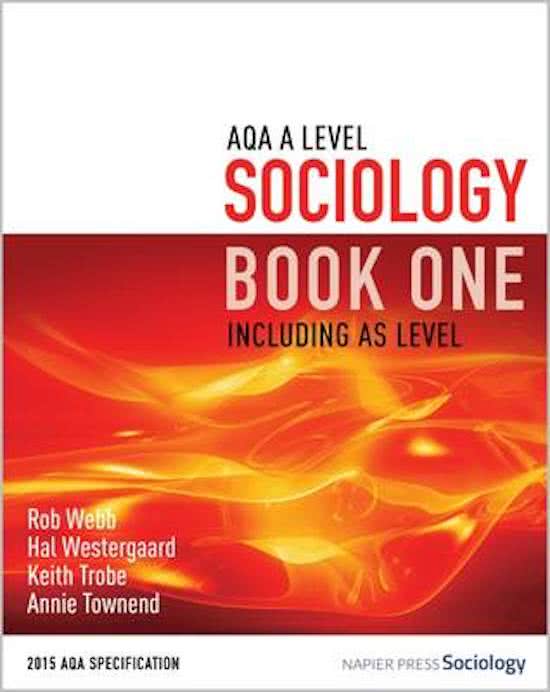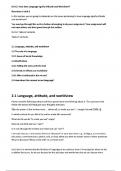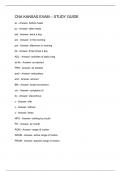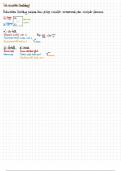Methods In Context
Revision Booklet
Primary Methods
, Quantitative:
Method of Study: Questionnaires:
Practical It may be difficult to generate a sample to take part. The best sample would be random sample where
everyone has the same opportunity of getting picked, this is a strength/advantage because it would
(SAP) make generalisations easier. (In context – tie it back to the question.) However, this is a difficult thing
to achieve when using questionnaires, so an opportunity sample is most commonly used. This involves
You must asking people who are available if they would be willing to take part. (In context –tie it back to the
show that question.)
every section However, the limitation/weakness is that the sample may not be representative because it may be that
is tied to the only a certain type of person will agree to complete a questionnaire. (In context – tie it back to the
actual question.)
question. Practically, the sociologist would have to make sure that the questions (to find out about) are not too
Don’t be long as this could put people off answering them. They would have to test their questions in a pilot
general. study which would give them a test run and a chance to iron out any problems and to make sure the
questions are understandable. The strength/advantage of this is that the sociologist can be sure that
their questions work and that they are not ambiguous (unclear), but the limitation/weakness is that
this could be time-consuming. If postal questionnaires are used the response rate is low, only around
25%. A way to overcome this would be to hand them out and collect them in in person, but this is time
consuming and could be expensive.
Ethical As the sociologist is not present, people are protected from harm in that they will not feel obliged to
complete the questionnaires. However, if the questionnaire is on a sensitive subject, e.g. bullying, the
questions could cause stress. As the researcher is not there, it is easier for the participants to withdraw
from the research. The sociologist should guarantee anonymity and should keep their names
confidential. This can be a problem if they discover that the participants are in danger. Tie it back to
the question.
Reliability Questionnaires are highly reliable, particularly if they use just closed questions. They can be repeated,
and tested for consistency. The sociologist could carry out the same study on …. Tie it back… with a
different group and expect to see very similar or the same results. Positivists see this as a strength.
Validity The results from questionnaires (into … tie it back) lack validity because it tells us that something is
happening, and possibly how frequently it happens, but not the reasons why it happens. They just give
us a statistic rather than uncovering the truth. Interactionists see this as a weakness of questionnaires.
Examples of Connor and Dewson used questionnaires and found even though HE has expanded with more people
studies going to uni, there are massive class differences with sonly 1/5 of students from the lower social
classes going on compared to 45% per cent from the higher social classes.
Representativ Quick and usually fairly cheap which means they can be given to bigger samples which makes
e. generalisation easier. However, If the sample is too similar it may not be representative. This is a
limitation/weakness because this can make generalising the results to the target population difficult.
(Methods in context -Tie it back)
Theoretical Questionnaires achieving quantitative data are preferred by positivists who see this detached method
Issues as a way of achieving scientific data. It is repeatable and measurable and can be used to discover
Do this first. patterns and trends. (In context -Tie it back)
However, Interactionists disagree and believe that people should not be studied in the same way as
rocks, plants or something in a test tube. The sociologist should form a relationship with the
participants. They should follow the concept of verstehen when they step into the person’s shoes to
see how they experience life. Questionnaires do not let this happen. (Tie it back.)
Revision Booklet
Primary Methods
, Quantitative:
Method of Study: Questionnaires:
Practical It may be difficult to generate a sample to take part. The best sample would be random sample where
everyone has the same opportunity of getting picked, this is a strength/advantage because it would
(SAP) make generalisations easier. (In context – tie it back to the question.) However, this is a difficult thing
to achieve when using questionnaires, so an opportunity sample is most commonly used. This involves
You must asking people who are available if they would be willing to take part. (In context –tie it back to the
show that question.)
every section However, the limitation/weakness is that the sample may not be representative because it may be that
is tied to the only a certain type of person will agree to complete a questionnaire. (In context – tie it back to the
actual question.)
question. Practically, the sociologist would have to make sure that the questions (to find out about) are not too
Don’t be long as this could put people off answering them. They would have to test their questions in a pilot
general. study which would give them a test run and a chance to iron out any problems and to make sure the
questions are understandable. The strength/advantage of this is that the sociologist can be sure that
their questions work and that they are not ambiguous (unclear), but the limitation/weakness is that
this could be time-consuming. If postal questionnaires are used the response rate is low, only around
25%. A way to overcome this would be to hand them out and collect them in in person, but this is time
consuming and could be expensive.
Ethical As the sociologist is not present, people are protected from harm in that they will not feel obliged to
complete the questionnaires. However, if the questionnaire is on a sensitive subject, e.g. bullying, the
questions could cause stress. As the researcher is not there, it is easier for the participants to withdraw
from the research. The sociologist should guarantee anonymity and should keep their names
confidential. This can be a problem if they discover that the participants are in danger. Tie it back to
the question.
Reliability Questionnaires are highly reliable, particularly if they use just closed questions. They can be repeated,
and tested for consistency. The sociologist could carry out the same study on …. Tie it back… with a
different group and expect to see very similar or the same results. Positivists see this as a strength.
Validity The results from questionnaires (into … tie it back) lack validity because it tells us that something is
happening, and possibly how frequently it happens, but not the reasons why it happens. They just give
us a statistic rather than uncovering the truth. Interactionists see this as a weakness of questionnaires.
Examples of Connor and Dewson used questionnaires and found even though HE has expanded with more people
studies going to uni, there are massive class differences with sonly 1/5 of students from the lower social
classes going on compared to 45% per cent from the higher social classes.
Representativ Quick and usually fairly cheap which means they can be given to bigger samples which makes
e. generalisation easier. However, If the sample is too similar it may not be representative. This is a
limitation/weakness because this can make generalising the results to the target population difficult.
(Methods in context -Tie it back)
Theoretical Questionnaires achieving quantitative data are preferred by positivists who see this detached method
Issues as a way of achieving scientific data. It is repeatable and measurable and can be used to discover
Do this first. patterns and trends. (In context -Tie it back)
However, Interactionists disagree and believe that people should not be studied in the same way as
rocks, plants or something in a test tube. The sociologist should form a relationship with the
participants. They should follow the concept of verstehen when they step into the person’s shoes to
see how they experience life. Questionnaires do not let this happen. (Tie it back.)









